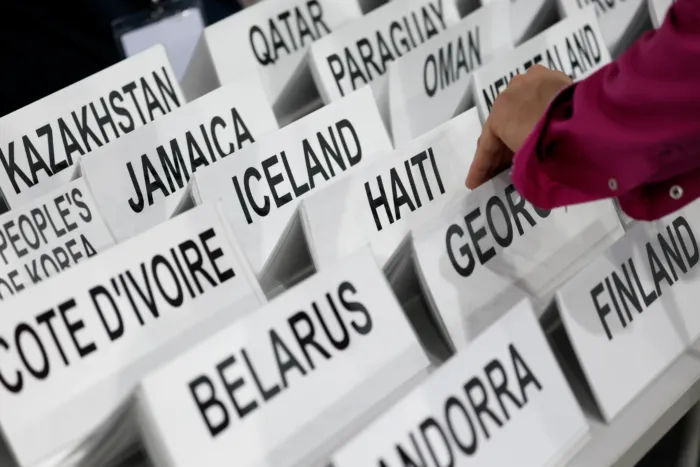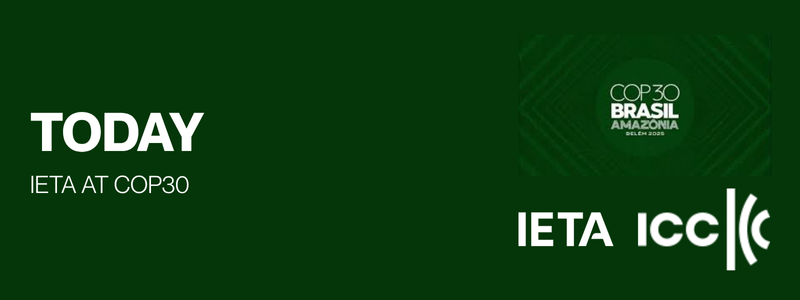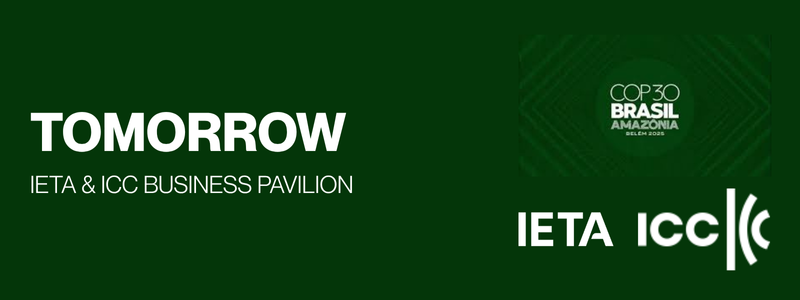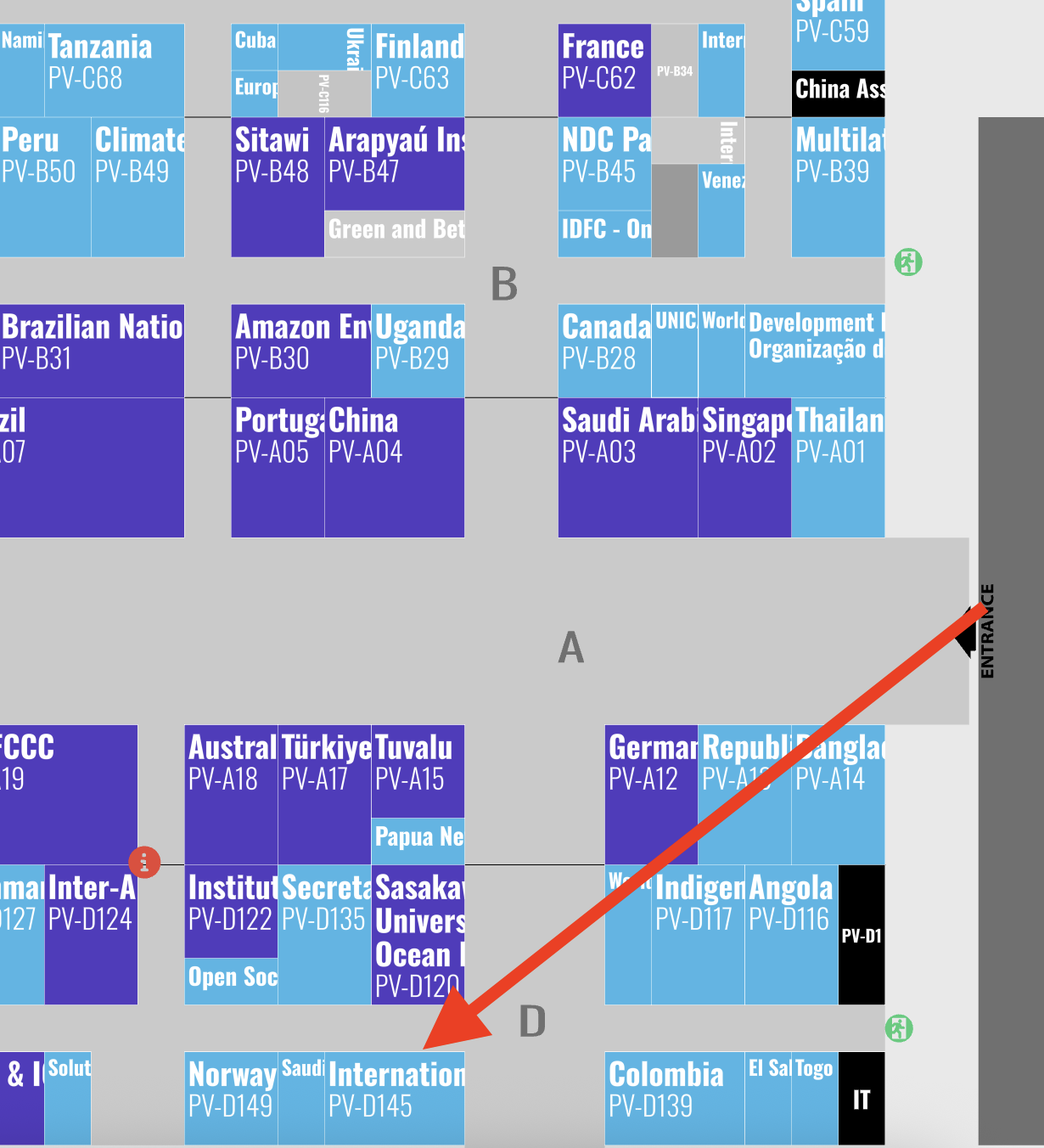

COP30 President André Corrêa do Lago was optimistic that Brazil's "mutirão" approach might lead to some key tracks of the talks being agreed as early as Wednesday. Photo: UNFCCC
Feeling refreshed after Sunday's break, delegates were back at work at COP30 with the ministerial segment of this year's summit getting underway bright and early. Ministers took to the plenary stage to deliver their national statements, before many of them dashed back into the informal consultations taking place on difficult agenda items.
COP president André Corrêa do Lago set the tone for the second week in what he admitted was a hurried letter to Parties, urging them to work "in task-force mode, to deliver the Belém Packages".
Brazil intends to encompass the most contentious issue in a first Belém package – likely to include the outcomes of its consultations on four agenda items: climate finance from developed to developing nations (Article 9.1), the gap in NDC ambition compared to the 1.5 degrees Celsius target, biennial transparency reports, and unilateral trade measures.
The second Belém package will contain other elements including agreed ways to measure progress towards the Global Goal on Adaptation, national adaptation plans, a response to the Global Stocktake, and on aligning climate finance with the net zero trajectory.
Do Lago explained that the first package deals with issues that are inter-related, "so if you solve it in one of the dimensions, which is the mandated negotiations, then you cannot solve it in the other one." This may have been a reference to reports that these key issues had been cropping up in many negotiating tracks, and corralling them into one wide-ranging conversation might prevent them from slowing up progress elsewhere.
The second package, he said, contains "things that are more autonomous".
At a press briefing this evening, do Lago said that the COP presidency had asked for, and received, permission to continue talks late into the night, with the goal of convening a plenary to approve at least the first package by Wednesday.
Brazil remained adamant that there would be no "cover decision" to encompass any of the items, saying only that there had been consultations over the four agenda items, and Parties were in agreement over what a decision related to those four topics would look like.
Elsewhere, EU commissioner Wopke Hoekstra has been feeling plenty of heat from many Parties who are unhappy at the bloc's Carbon Border Adjustment Mechanism, which many of them call a "unilateral" trade measure that impinges on their own Nationally Determined Contributions.
At a press conference on Monday, Hoekstra responded that the EU "was not going to be lured into the suggestion that actually CBAM is a unilateral trade measure. In that realm, we're not going to discuss it. [CBAM] is meant as part of our climate toolbox, making sure that basically, emissions don't leak out of the European Union."
Also speaking to the press, Denmark's minister Lars Aagaard urged other major emitters to boost their NDC goals to match Europe's 90% goal by 2040, and to cut their emissions in line with science, before going on to announce Denmark's new national climate target of an 82% reduction from 1990 levels by 2035, by-passing the UK's 81% as the most ambitious goal in the developed world.
We shouldn't neglect to applaud South Korea's announcement that it will close all its remaining coal-fired power stations by 2040, as it formally joined the Powering Past Coal Alliance. South Korea currently generates about a third of its electricity from coal and is the world's fourth-largest importer.

European climate commissioner Wopke Hoekstra has come under fire from countries unhappy about the EU's Carbon Border Adjustment Mechanism. In turn, the EU objects to CBAM being discussed at COP. Photo: UNFCCC
In the negotiations
Late on Saturday, the Secretariat published new draft negotiating texts for Article 6.2 and Article 6.4, giving the lie to the notion that Sunday was a day off at COP...
With the new texts digested, the presidency scheduled four informal consultations for today, two for each of the market systems.
On the Article 6.2 draft, our team reports that it's quite ambiguous and contradictory in parts. It addresses issues such as the need to improve the training of the technical expert reviewers, requesting the UNFCCC Secretariat to increase the level of disaggregation of the information detailed in the reports, and improving the reporting capacity of Parties through workshops and exchange spaces. In addition, it requests information on the status of the Article 6 system registry.
Parties' interventions were varied and addressed almost all points of the draft decision text.
Switzerland, AILAC and LDMC agreed that previous decisions were being reinterpreted and repeated. New Zealand emphasised that Parties must acknowledge that there has been no substantial negotiation on this agenda item and that it is not necessary to create one where none exists.
It called for consistency, given that only the first round of initial reports under Article 6.2 had been completed and published and there was not a sufficiently robust sample to understand whether the process was working well or poorly. While capacity-building was necessary among Parties, it was necessary to allow the process to mature.
The secretariat was due to deliver a new draft by the end of Monday or on Tuesday.
In the first Article 6.4 informal session the co-facilitator needed to organise interventions on the draft text into "baskets": the first basket covering Sections I to III, the second basket from Section IV, and the third basket from Sections V to VIII. Due to time constraints, the Parties intervened only on the first basket.
The core governance issue as expected was the proposal to revise term limits for SB members.
Parties focused heavily on the three options in paragraph 7 on term limits for Supervisory Body (SB) members and alternate members. LMDC supported Option 2 (proposing to revise immediately) and proposed adding text in the annex to allow members/alternates to serve two terms, take a mandatory two-year break, and then serve up to two additional terms, with this cycle repeatable.
The African Group also preferred Option 2 with a mandatory break, but did not want the same term rules automatically applied to the Methodological Expert Panel (MEP).
Russia preferred Option 2 but without the mandatory two-year break; they asked to add a clarification so that members can serve more than two terms consecutively if re-elected by the CMA.
The EU, Japan, Switzerland appeared to change their approach, with some favouring Option 3 (no text and/or no change now) or, at most, Option 1 (revisit in 2028) rather than reopening term-limit rules immediately.
Singapore explicitly called for the term-limit review to be decided now in this decision, rather than postponed.
On the Preamble and framing, the preambular paragraph 4 is contentious. The EU and the UK are in favour of keeping it with possible tweaks, but Russia and Switzerland called for it to be deleted, noting it does not reflect the previously agreed language.
Several Parties, notably the African Group, the EU, Switzerland and the UK also asked to delete paragraph 8 on aligning MEP terms with SB terms.
On the timing of annual reports (paragraph 11), we saw convergence among the African Group, the EU, Japan, Russia and others around requiring the SB annual report to be available two weeks in advance of its consideration by the CMA, giving Parties more time to review.
On gender balance and composition, the EU called for stronger language on gender balance in the paragraph addressing the current gender imbalance in SB membership (paragraph 9), while others did not object strongly.
On transparency and stakeholder engagement (paragraphs 18–22), the African Group, the EU, the UK, Switzerland, AOSIS, CfRN and the Arab Group focused on strengthening transparency and participation without micromanaging the SB.
Switzerland flagged paragraph 20(b) as potentially amounting to procedural micromanagement and requested careful wording.
For paragraph 22 (on transparency of SB and MEP decision-making), AOSIS, CfRN, the Arab Group and Switzerland supported removing the brackets, keeping the text, and the UK asked for even more transparency.
CfRN requested deleting the reference in paragraph 6 to “facilitate demand for A6.4 ERs”.
Switzerland suggested minor drafting changes: adding “and other stakeholders”, adjusting the reference to Indigenous Peoples (“as well as” instead of “and”), and ensuring consistency.
The second 6.4 informal was cancelled, and we await news of a follow-up.
There was also a further updated and expanded Article 6.8 text issued on Monday evening. As with the previous iteration, the entire text is in brackets, which observers said likely reflects the divisions in other tracks.

Pedro Venzon and Elisa Guida launched a report on high-integrity climate action in the Amazon region based on work done by our joint ALMA project with the Oil and Gas Climate Initiative. Photo: IETA

Pedro Venzon led IETA's programme on Monday at the IETA-ICC Pavilion, presenting IETA's new report on high-integrity climate action in the Amazon region. The ALMA Brasil is a project developed by IETA, in collaboration with the Oil and Gas Climate Initiative (OGCI), since 2023. The initiative follows a phased approach its report draws on the lessons and key findings from its central objective: to explore solutions for nesting REDD+ projects into JREDD+ programmes, with the aim of increasing transparency, strengthening market confidence, and enhancing performance in reducing deforestation in the Brazilian Amazon.
The event featured remarks from representatives of the government of Pará, OGCI and Petrobras, followed by a panel of speakers from the Legal Amazon Consortium, The Nature Conservancy (TNC), the Amazon Environmental Research Institute (IPAM), Wildlife Works, and Coralia Environmental, which is responsible for developing the JREDD+ programme in Misiones province, Argentina.
Earlier, IETA participated in the launch of the Scaling JREDD+ Coalition. The coalition is made up of a group of governments, Indigenous Peoples and local communities, civil society, and the private sector committed to expanding high-integrity forest carbon finance. IETA is among the signatories to the coalition, recognising the importance of supporting nature-based solutions. The statement and summary of proof points are available here.

All event times are listed in Brasilia time (BRT), which is three hours behind GMT and 11 hours behind Singapore time.
The IETA/ICC Business Hub is located in Pavilion D145 (see image below). It's in area D of the Delegation Pavilions hall, quite close to the main entrance, and our neighbours are Colombia, the World Meteorological Organisation, Saudi Green Buildings Forum and the Oceans pavilion.
IETA has two side event venues within the Hub: the Boardroom and the Side Event Theatre. You can find the IETA schedule of events here, while the UNFCCC has produced an online schedule of side events here.
Terraformation launch us into Tuesday at the IETA-ICC Pavilion at 1030 BRT, showcasing Cameroon’s national reforestation strategy and its Iroko Restoration Project,, a flagship public-private partnership contributing to the country’s forest and climate goals.
Also at 1030 BTR in the IETA Boardroom, we will host an invitation-only VCM Roundtable event on "Convergence on Principles for the VCM: Building Consensus to Scale Demand and Integrity".
And IETA's official COP30 side event takes place tomorrow, at 1315 BRT in Side Event Room 3! IETA, IATA and FICCI will jointly present a session entitled "Unlocking Article 6 through CORSIA: Demand, Nature, and Scale", exploring how strong demand signals, integrity standards, and nature-based solutions can unlock large-scale, high-impact projects and enable long-term carbon finance through off-take agreements. We will welcome speakers from Abra Group, the ICAO Technical Advisory Body, Coralia Environmental and TruAlt Bioenergy.
Other events of note outside our Pavilion include a Singapore/ICC event in Side Event Room 8 at 1130 BRT to launch of present the recently launched Coalition to Grow Carbon Markets. This event will discuss how the Coalition’s principles and other global frameworks can encourage greater collective corporate action, supporting global climate action.
Unfortunately, our own side event clashes with two other interesting sessions at 1315 BRT. The first takes place in Side Event Room 4; the European University Institute, Germany's BVEK and others will discuss how to ensure integrity and cooperation in an increasingly globalised carbon market. Many jurisdictions plan to use domestic and international credits to reach NDC targets. This new impetus could lead to a more integrated global carbon market. As preconditions, carbon credits must be of high quality and international cooperation mechanisms credible. Speakers will include Simone Borghese and Jos Delbeke of EUI, Robert Tippmann of BVEK, as well as representatives of Tsinghua University, Seoul International Law Academy and the World Union of Small and Medium Enterprises.
And also at 1315 BRT in Side Event Room 1, the UNFCCC will host a discussion on advancing carbon pricing and Article 6 implementation through the CiACA Initiative. Various parties, supported by the Collaborative Instruments for Ambitious Climate Action (CiACA) funded by the Government of Germany, will share their experiences and lessons learned in exploring and implementing carbon pricing instruments and Article 6 to achieve their climate commitments.
